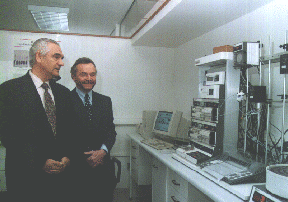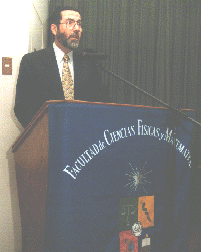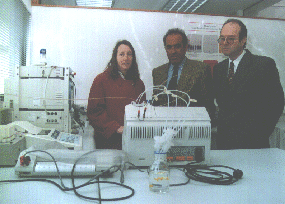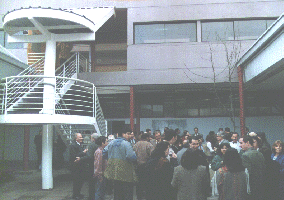
CENTRE FOR EXCELLENCE IN BIOCHEMICAL ENGINEERING AND BIOTECHNOLOGY IS INAUGURATED. |
|
NEWS BULLETIN |
|
 |
The Centre had a cost of US$2,3 millions, and its aim is to carry out doctoral research studies in Biochemical Engineering and Biotechnology. It has four advanced laboratories and its objective is to form researchers as well as to prepare professionals in this area of engineering. The technologies that will be developed in this Center include the characterization and production of proteins for industrial and medical use, studies of genetic engineering, mathematical modeling and the optimization of the synthesis of enzymes and recombinant proteins using microbial and animal cells. |
The Building and the equipment were financed thanks to contributions from Fundación Andes, Ministerio de Educación, FONDECYT, Faculty of Physical and Mathematical Sciences of the University of Chile and the collaboration of private companies. Dr. Asenjo contacted Professor Igor Saavedra and Eugenio Cáceres of Fundación Andes as possible sponsors for the elaboration of this project. In October 1993, the project began to carry out the “transfer” of know how from Asenjo’s Lab in England with two Chilean doctoral candidates, who would do their work at Reading and in Santiago, in a “split-PhD”, Ms. María Elena Lienqueo and Carolina Shene. The final financing came from Agencia Cooperación Internacional and private enterprise. |
|
This initial period and the search for support, was successful. But also there were disappointments, like when the initiative with the Goverment of Sweden did not come to fruition. This project consisted of technology transfer between that country and Chile, in the field of "Modern Methods and Rationalized for Techniques of Separation and Protein Characterization used in Technology of the Recombinant DNA", a very deficient area in Chile. The academics who were involved in this project made several trips between Reading (England), and Chile, wrote a lot of proposals and worked very hard from January 1993 until January 1995, when the centre started its functions. Finally, the transfer of “know-how” was executed by 2 postdoctoral workers and 2 collaborators of the English Group who obtained postdoctoral fellowships from Fondecyt and moved to Chile . The genetic engineer worked in the Laboratory of Professor Jorge Allende for two years while waiting for the Molecular Biology Laboratory of CIByB to be ready. |
 |
 |
In 1995, Fundación Andes provided all the advanced equipment, which permitted the Centre to have a doctoral programme. There are 9 doctoral candidates several of them foreign. The Center has 4 complementary laboratories, this makes the Centre self-sufficient and unique ( from the gene and the protein to the engineering and the applications) : |
The main research areas of this Centre are : Protein Engineering and Metabolic Engineering ,Cloning, Fermentation and use of Recombinant Strains, Separation and Characterization and Protein Engineering, use of expert systems for Design and Environmental Protection. These included investigation with modern tools of engineering such as Mathematical Modeling, Optimization, Molecular Modeling, use of Neural Networks and Expert Systems. The center obtained a FONDEF project that included the extraction, purification and characterization of cryophilic protease enzymes with high activity at low temperature) from marine sources and cloning them in yeast to be able to produce them industrially at low cost. These enzymes will be for detergents utilized at normal and low temperatures with a great saving of energy. Emergent areas that the Center is evaluating are the DNA Chips, gene therapy (culture of healthy cells to cure e.g leukemia) and culture for transplants, and also the separation and purification of human a recombinant protein (antitripsin of milk of a ewe cloned by the group in Scotland of the Dr. Ian Wilmut “Sally”, previous to “Dolly”) ”We expect the Center for Academic Excellence in Biochemical Engineering and Biotechnology to be a focus of doctorates in engineering and a good example for other academic areas of applied science and engineering. This Center already is a focus of important attraction for students of Chemical Engineering. Besides, it has helped to provide the academic infrastructure for a new degree : Biotechnology Engineering of this Faculty, generating a center of attraction and interest for very good students. |
|
I want to thank all the people, institutions and companies that have made the development of this Center possible: Fundación Andes, for all the equipment, the reinsertion project and the doctoral scholarship. Ministry of Education. CONICYT for Fondecyt projects, 2 postdoctoral projects and doctoral scholarships. International University Exchange Publicaciones Lo Castillo Group of Companies SALO Quintec Group (Computerland and Silicon Graphics) |
 |
INUAL and recently FONDEF. The Rector of the U. of Chile Jaime Lavados in his intervention emphasized that the creation of this Center is very good news for the University of Chile and for the country. He indicated that the future for our country depends on the developments of Biotechnology in the industrial area as well as in the medical area. |
|
|
|